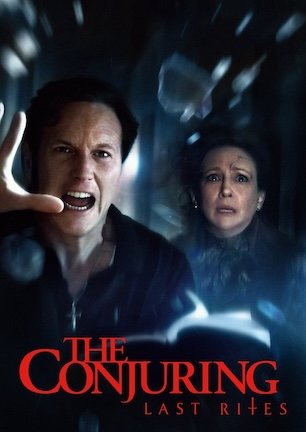Studio: Shudder
Director: Joko Anwar
Writer: Joko Anwar
Producer: Gope T. Samtani
Stars: Tara Basro, Bront Palarae, Dimas Aditya, Endy Arfian, Nasar Anuz, Muhammad Adhiyat, Arswendy Bening Swara, Egi Fedly, Ayu Laksmi, Elly D. Luthan, Fachri Albar, Asmara Abigail
Review Score:
Summary:
Following a tragic death, siblings uncover a disturbing connection between their family and a satanic cult.
Review:
“Satan’s Slaves” loosely remakes the Indonesian film “Satan’s Slave,” which is either from 1980 or 1982 depending on the information source, but is decidedly different than the same-named 1976 movie with Michael Gough alternately titled “Evil Heritage.” More interestingly, the original “Pengabdi setan,” as it’s known in its native tongue, is in turn allegedly an even looser remake of Don Coscarelli’s 1979 classic “Phantasm” (review here). With unusually exotic lineage like that, you should have a solid starting reference point for the sort of devilishly dreamy intensity conjured by this 2017 incarnation.
Rini’s recording artist mother Mawarni has seen much better days, both career wise and health wise. Lying on her deathbed, Mawarni’s catatonic condition has left her family, which includes Rini’s father, grandmother, and three younger brothers, burdened by home care and flirting with financial destitution.
While far from the outcome anyone prefers, Mawarni’s death should provide some solace, if not for emotional peace than at least for the household bankbook. Instead, the ill woman’s sudden demise starts a series of supernatural encounters stringing back to a sinister secret in her past.
Rini and her siblings have a heritage that has unknowingly haunted everyone since birth. Now that heritage haunts them literally in the form of ghosts, zombies, and cultists determined to take a payment previously promised by Mawarni.
Imagine “Hereditary” with a foreign fright film flavor, but presented with James Wan’s sense of cinematic spook-showmanship. Introductory explanations involving “Phantasm” riffs notwithstanding, that’s as close as one can come to approximating the texture of writer/director Joko Anwar’s Indonesian thriller in a single “it’s like” sentence.
“Hereditary” (review here) and “Satan’s Slaves” share more in common than devil-worshipping family ties. Like Ari Aster does with his film, Anwar anchors the thematic core of his creeps around the earnest emotion of mournful melodrama.
From the youngest brother to the eldest woman, actors across the board embody endearing personalities organically, creating characters that drive “Satan’s Slaves” on an interior engine of tearful tragedy and sympathetic struggles. Interpersonal relationships tether terror terrifically so that drastic swings into frightful fantasy don’t seem so unbelievably improbable.
The film’s other fist hits harder still with hearty horror. “Satan’s Slaves” overflows its deep sink with all the macabre madness it can manually muster. It’s easy to picture Anwar gleefully going down a list checking off classic chiller tropes. Possessed children, reanimated corpses, ghoulish mirror reflections, and cultists standing still in silhouette don’t even scratch the surface of how viewers are taken on an all-encompassing audiovisual tour of scary movie staples.
“Satan’s Slaves” features plenty of inherently moody moments, although Anwar obsessively orchestrates each one into an unnecessary jump scare, dousing scenes in 70s-inspired slow zooms and sudden audio stings. There are only so many whip pans to a ghostly visage an audience can stomach before they begin arriving with such regularity as to become entirely ordinary.
Anwar’s knack for stylish staging is self-evident in techniques that touch tones of “The Conjuring” (review here) and “Insidious.” But he often operates at a nine, such as when overusing lightning flashes during an ominous rainstorm or adding an angelic aria to the piano keys of a “Rosemary’s Baby” score. Dialing instincts down to a seven would temper eeriness to be more effective. Overloading on exuberance ultimately limits “Satan’s Slaves” to being really good at its game instead of inarguably great.
Refusal to recognize when too much is too much also stutters pacing by making the film last longer than its story requires. Even Rini finds herself forced to flip between suspecting supernatural strangeness and sudden skepticism whenever the script has no better alternative for slowing down to deliver more mid-movie exposition. Purposeful plot impediments stick out for being what they are: momentary contrivances meant to either extend scenes or connect them later down the line.
A knock-on effect of the screenplay’s structure means certain setups mentally write their outcomes well in advance of the movie addressing the obvious. No one needs a crystal ball to envision how events involving a motorcycle, water well, or dropped paper will play out, for example.
However, crimes of laying things on thick or being a touch too predictable only qualify as misdemeanors when a movie hits terrific notes of tension as well as “Satan’s Slaves.” Joko Anwar builds solid substance from painfully human currents draped chokingly beneath inhuman dread. In spite of some familiarity, Anwar taps a formula for being frightening that sets up “Satan’s Slaves” as an impressive example of carefully crafted Indonesian horror.
Review Score: 75






It’s a better idea to lighten up on the outrage and enjoy “Predator: Badlands” for its high value as an action-intensive outer space adventure.